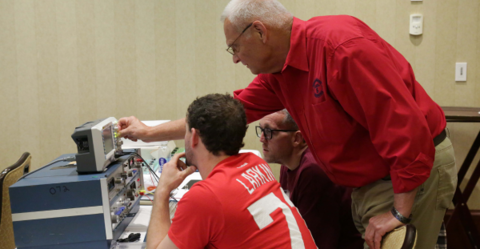The International Union of Elevator Constructors (IUEC) offers elevator apprentices more than stable elevator union jobs and elevator union wages – it offers a lifetime career that for most members has spanned generations. The IUEC offers union elevator careers, an elevator union salary, and ultimately an elevator crew that always has your back.
You’re Never Too Young to Score a High-Ranking Career
No more significant experience exists for young people to start a career than in the elevator apprenticeship program(s) of the IUEC. The National Elevator Industry Educational Program (NEIEP) is available to applicants at least 18 years of age, with a high school diploma or a state-approved GED.
Candidates can apply to the elevator union apprenticeship program at the available locations listed on the NEIEP career page. NEIEP Area Coordinators will invite applicants to take part in the Elevator Industry Aptitude Test (EIAT), consisting of three sections: basic mathematics, verbal reasoning, and mechanical skills.
To pass the EIAT, applicants must score at least 70%. After you’ve passed the test, you’ll be contacted and scheduled for an interview by representatives of the Joint Apprenticeship Committee (JAC) – an IUEC representative and an employer representative. You’ll also complete a tool assessment, where applicants are asked to identify specific working tools. There are many IUEC signatory employers across North America, including the global industry leaders Otis, Schindler, Kone, Fujitec, Mitsubishi and TK Elevator. You are never too young to start the best blue-collar career and secure your future.
What Certification/Preparation is Best to Complete Before Your Elevator Apprenticeship Interview?
Applicants who wish to enroll in the IUEC’s elevator constructor apprenticeship program need at minimum a high school education or its GED equivalent. As an aspiring elevator apprentice, it will be helpful if you have previously taken courses in physics, electricity, and mathematics. Additionally, possessing knowledge and skills in reading a tape measure and following instructions are beneficial. Shop courses on carpentry, welding, pipefitting, or electrical work also provide a decisive advantage.
Continuing Education and Training
Continuing education is essential to the IUEC elevator mechanic’s success as well as way of life, and it all starts within the NEIEP apprenticeship program.
After you have passed the EIAT and final interview, you will be placed on a ranked list. When a position opens, you’ll be called by the IUEC to begin work as a probationary employee, and you will start your college-level NEIEP apprenticeship program. This consists of over 8,000 hours of on-the-job learning (OJL) where you earn while you learn, as well as a minimum of 576 hours in theoretical and practical courses of related instruction.
During your apprenticeship OJL, you will work and learn under the supervision of your IUEC mechanic performing all aspects of elevator installation, modernization, and repair – all while you learn the theoretical aspects of the trade one night a week in the NEIEP classroom. During these courses, instructors will cover subjects such as electrical fundamentals, hoistway structures, solid state theory and application, power and logic, and many others.
During your time as an elevator apprentice, you will be working on the installation, repair, and maintenance of passenger and freight elevators, escalators, dumbwaiters, or moving sidewalks.
Elevator Apprentices Get Paid to Learn
Unlike other educational programs in which you usually pay to learn, in the NEIEP Apprenticeship Program, YOU are the one getting paid to learn. During your apprenticeship, you earn a percentage of the mechanic’s rate, increasing upon completion of two semesters until after your eight semesters are completed and you pass your mechanic exam.
During the first six months, you are a probationary apprentice and earn 50% of the mechanic’s rate. As a first-year apprentice, you make 55%, as a second-year, 65%, third-year, 70%, and, finally, as a fourth-year apprentice, 80%.
You Get All the Benefits Sooner
Because employers have signed a Collective Bargaining Agreement (CBA) with the IUEC, they are bound to make fringe benefits on behalf of the employees that work under the agreement. This means that, by federal law, employers make contributions to the National Elevator Industry Pension Fund, the National Elevator Industry Health Benefit Plan, the National Elevator Industry Educational Program, and the Elevator Constructors Annuity and 401(k) Retirement Plan and the Elevator Industry Work Preservation Fund on your behalf.
Bottom line: you get all of those benefits by joining the IUEC.
So Why Overthink?
Most members of the IUEC say they wished they had joined it earlier in their lives, that they would have grabbed the opportunity if it had been presented to them earlier. Members of the IUEC are Brothers and Sisters. Move through the apprenticeship ranks of probationary, apprentice, and then NEIEP qualified elevator mechanic. Give back by becoming a NEIEP Instructor, Local Union Officer, or even an International Officer.
Imagine how far you could soar with the IUEC. And imagine what you could do for your family and future with the benefits package.
The sky’s the limit with the IUEC.







